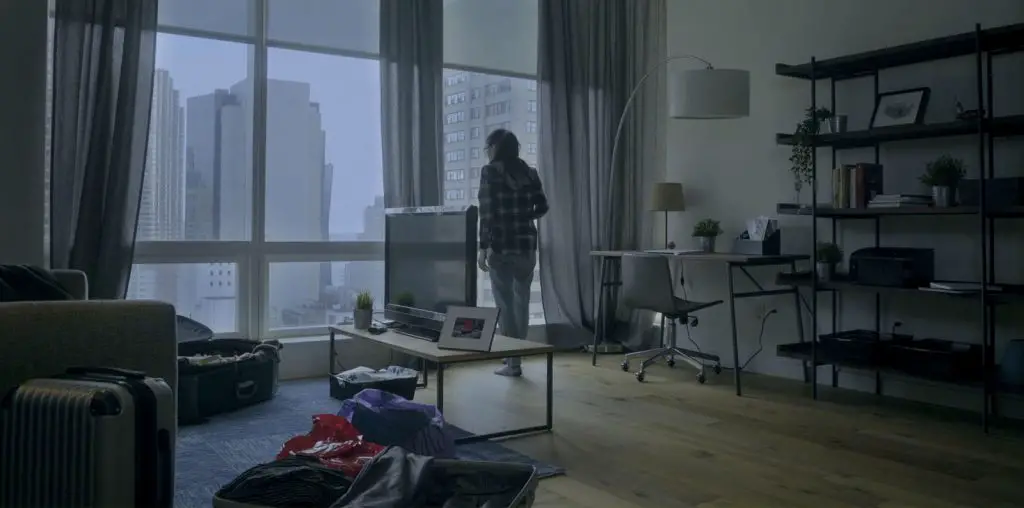
“What if?” is a question that films love to answer. Some filmmakers go down the political path, as others make an earnest attempt to make real predictions of the future. But for the most part, “what if” is meant to be a conversation starter looking at the positive and negative answers to the question.
In Andrew Wright’s Belushi’s Toilet, he asks, “What if we lost the drug war and all narcotics are now declared legal?” What would America look like? While Belushi’s Toilet does not address the politics of the subject, he looks at it from a personal level. The film follows a group of friends navigating life in this new free drug world.
Set in the not-so-distant future, four friends—Adrian (Mark Nocent), Mason (James Soares-Correia), Hyman (Hayden Finkelshtain), and Raul (Alex Frankson)—find themselves coming off a mind-bender thanks in part to Mason’s latest formula. In fact, Hyman finds himself wearing a dress in a women’s prison.
The premise of the film is relatively simple. Mason works for a pharmaceutical company. Secretly, he’s been attempting to create the perfect party drug. One that offers a “clean, exquisite, pure, focused rush” with no comedowns or side effects. Because in this future, drugs are tested on virtual rats and humans, the test results are unreliable, so Mason and his friends volunteer as human lab rats.

“…Mason and his friends volunteer as human lab rats.”
In reading the notes for Belushi’s Toilet, the film was originally a series of short episodes, and it certainly feels that way. Each episode follows one of the main characters and their individual drug adventures. It starts with Adrian, who is a collector and buys a record player from an antique store. Mason brings over his latest party drug and the two dance and snort drugs off the spinning record “piece of vinyl.”
Then there’s Hyman, who has no personal self-confidence. He a drug as a quick confidence booster on a date. But his incessant ramblings and bloody nose torpedo his chance at love. The film also places its characters on a three-way tryst, a dying mother, and through quiet moments of philosophic self-reflection.
Director Wright and screenwriter Mark Sear also address the technology and politics of the world at this time. The technology relies heavily on Virtual Reality. Everything wears paper-thin goggles and swipe their hands in the air. Also, drugs have now become the most prominent industry, demanding newer and better drugs are being produced every day, but not with the best oversight for quality. Drug cafes are taking over Starbucks as it offers a better pick-me-up than coffee.
The film ultimately takes us down the path of a drug-induced lifestyle, where there’s a pill for every emotional problem or hang-up, and our protagonists slowly suffer from its prolonged effects.
I’ll start by saying that Belushi’s Toilet was a struggle for me to watch. While I loved the idea and premise of the film, it’s hard to follow, especially if you’re not into or understand current recreational drug culture. As Mason describes the chemical compounds of his “latest batch,” he uses a lot of scientific jargon, and I began to wonder if he’s making half of it up. All this to say, it can be challenging to track discussions unless you’re fully engaged.

“…Wright and Sears have some interesting, even profound, things to say and present about this inevitable future.”
The second problem is character development. A common criticism of film characters is they’re not “likable.” I don’t subscribe to that at all, but I will say they are “unrelatable.” Essentially the film is about four guys, who take copious amounts of narcotics, bad stuff happens to them, and they cope with it. Just watching bad things happen to main characters is not enough for audiences to emotionally invest in said characters. We connect by finding common ground with a character, often through backstory or shared experiences and then feel the consequences/successes of that character’s actions. Again, these are just guys who take drugs and bad things happen. They date, they work, they disconnect from reality, but that’s just not enough for us to care for the characters.
Filmmaker Wright and Sears have some interesting, even profound, things to say and present about this inevitable future. The world they build is well thought-out and reasoned, but it lacks a firm stance on the subject. Is the world getting better, or is it getting worse? It takes the middle road stance of “it’s inevitable.” By the end, the arc of its characters’ journey feels incomplete and unfinished.
In the end, the two hours felt very long. I’m not sure that sewing together episodes of a mini-series was the right choice. A film needs linear story momentum from beginning to end. A mini-series, on the other hand, can address specific ideas and issues and tell an overarching, open-ended story at the same time.

Belushi’s Toilet (2019) Directed by Andrew Wright. Written by Andrew Wright and Mark Sear. Starring Mark Nocent, James Soares-Correia, Hayden Finkelshtain, Alex Frankson.
4 out of 10 stars


